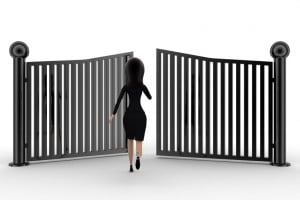[ad_1]

Ed. note: This is the latest installment in a series of posts on motherhood in the legal profession, in partnership with our friends at MothersEsquire. Welcome Morghan Richardson to our pages. Click here if you’d like to donate to MothersEsquire.
When people ask me how I knew it was time to leave Biglaw, I often tell the following story: I was a fifth-year associate, struggling with work-life balance in a practice area that did not inspire me to get out of bed in the mornings. Add to the fire that I had a toddler and was pregnant with my second child. I inquired about changing practice areas, but after five years, I was told that was not possible because “this is who you are now.” What a ridiculous and terrifyingly narrow
mindset — do not believe it. But, how do you gain experience or information about a new practice area? How do you leave Biglaw and come back stronger for the win?
In addition to attending CLEs in other practice areas, I took several pro bono matters in areas that interested me. One of my pro bono clients helped to propel me out of the inertia that can come when you are highly paid, have loans, and a family to support. The client (I’ll call her Sarah) had gotten someone to murder her husband and was suing the state of New York for having placed her into solitary confinement for too long (a prisoner may only be placed in solitary for a limited time, and anything more triggers the right to seek compensation). I met with her to discuss her lawsuit.
She confided in me the nightmare experience of solitary confinement – reading all day, eating alone, and speaking to no one. As an associate at a 500-plus attorney firm, when I realized how much I was relating to my client’s descriptions of solitary confinement, I knew I had come to a breaking point.
Obviously the moral of this story is not meant in any way to undervalue the severe hardships that those subjected to solitary confinement suffer. (In fact, solitary confinement for more than 15 consecutive days is recognized as torture by the United Nations and other human rights groups).
Yet, there are certain lifestyle issues that go in-hand with Biglaw that left me feeling trapped, devoid of human connection, and unfulfilled. The isolation that I felt as a young female associate was very real, as was my identification with that Promethean struggle, similar to what Sarah described (despite my place of incredible privilege). The lifestyle creep, the demands of partners
who lacked time management skills, the eating (and sometimes sleeping) at my desk, and a clear lack of female partner role models: I knew that I needed out, and so I made the leap from Biglaw to solo, and corporate to matrimonial.
One thing that Biglaw does well is to instill a work ethic and willingness to work long hours in young attorneys. That stamina helped to drive me in my newly selected path, a career in family law. I pushed myself to work as hard as I could to become proficient. I attended CLEs on family law and law practice management. I networked with other attorneys and reached out to everyone that I knew for advice, guidance and support. I spent my “free time” at court, immersing myself in the proceedings. My hard work paid off and my practice grew. At one point I had five associate attorneys working for me, and was retained to handle a divorce involving a “Real Housewives of New York” persona. It was thrilling to take on a highly public case against a much larger law firm. But most importantly, I was able to choose an area of practice that challenged and fulfilled me in ways that my previous career and practice in Biglaw had not.
Ultimately, the heavy lift of running a small firm, litigating (and parenting) was a challenge. I realized that by merging with a larger firm, it would help me cut down on some of the management issues, and allow me to focus on the actual legal practice. By building up my practice, I realized the value that I could add to any larger firm that I approached. I made a move into partnership, bringing along associates. Eventually, one of my partners and I moved to an even larger firm, co-founding the firm’s matrimonial and family law practice. We design our
department and set the standards so that our attorneys can grow as advocates and avoid feeling trapped or unfulfilled in the ways that I had previously experienced. My work is exciting and rewarding, and my firm is a unicorn in terms of culture and ideals.
My lesson for you, if you are feeling stuck in any one legal path, is to keep searching — keep pushing yourself to find the better fit for your life.
 Morghan L. Richardson of Tarter Krinsky & Drogin focuses her practice on divorce and family law and regularly handles cases that involve complex divorce litigation, alimony, child support, pre-nuptials, parent coordination, separation agreements, post-nuptial agreements, parental access and visitation, collaborative divorce, property division, equitable distribution, orders of protection, and LGBTQI family law issues.
Morghan L. Richardson of Tarter Krinsky & Drogin focuses her practice on divorce and family law and regularly handles cases that involve complex divorce litigation, alimony, child support, pre-nuptials, parent coordination, separation agreements, post-nuptial agreements, parental access and visitation, collaborative divorce, property division, equitable distribution, orders of protection, and LGBTQI family law issues.
Ms. Richardson has fought complex divorce cases with clients that include a Nobel-Prize nominated economist, a prominent music magazine editor, and one of spouses on the hit television show “The Real Housewives of New York.”
[ad_2]




